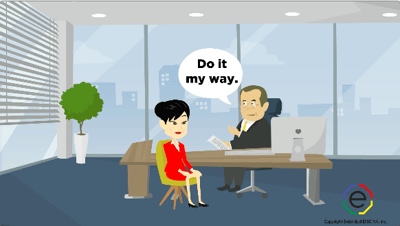The D-style personality type is one of the four main DISC styles. What makes this style unique from the other styles? How does a D-style become more successful?
Meet Maxine: A D-style personality type
 If you were to ever meet Maxine, it wouldn't take you long to recognize he ultra competitiveness. She's a D-style personality type. Although Maxine usually greets people she meets with a smile, there's an intense energy to her. Simply put, Maxine wants to win in everything and anything she participates in. She always wants to finish first. Maxine thrives when there are many things happening at the same time. She loves directing chaotic settings. Maxine seems to want to push people and things to the very edge of being out of control. The thrill of activity, speed and moving forward clearly provides Maxine with energy and motivation.
If you were to ever meet Maxine, it wouldn't take you long to recognize he ultra competitiveness. She's a D-style personality type. Although Maxine usually greets people she meets with a smile, there's an intense energy to her. Simply put, Maxine wants to win in everything and anything she participates in. She always wants to finish first. Maxine thrives when there are many things happening at the same time. She loves directing chaotic settings. Maxine seems to want to push people and things to the very edge of being out of control. The thrill of activity, speed and moving forward clearly provides Maxine with energy and motivation.
Maxine is on the fast track to success
Maxine is in her mid-forties. She is part of the executive team of an organization with about 8,000 employees where almost 5,000 fall under her division. She is the youngest of the executives, but is also widely considered to be one of the most talented. Since starting her career at the company, she has produced the kind of financial results that do not go unnoticed. Maxine got promoted quickly and with each move grew hungrier, more driven and motivated.
Maxine was known for her intelligence. She also is one of those rare few who have an almost perfect photographic memory. Maxine could quickly glance at a spreadsheet and repeat all the numbers to the awe of others. She could also remember everyone's name. For example, she could just meet a prospect or a customer once and very briefly. Then months later, she's able to call the person by name if she unexpectedly ran into that person on the street. Maxine very quickly stood out from the rest. Most of the 5,000 people who work for Maxine respect her. A couple of her direct reports appear to want to be exactly like Maxine. One of them is even nicknamed “Little-Maxine” because it is so obvious though she cannot pull it off and it is apparent to everyone.
What is derailing Maxine?
While Maxine’s incredible memory is legendary throughout the organization, so is her short-temper and inability to not to speak hier mind. No one wants to upset Maxine. No one wants to correct, object or disagree with her. Even so, Maxine loses her temper frequently. She gets easily frustrated when she has to repeat herself, focus on details, or slow down her pace. She rants and intimidates. Sometimes she has been know to even throw objects within her reach.
However, Maxine is more tactful with the other key executives. She realizes he needs to hold back in order to achieve her ultimate goal of CEO. Not surprisingly, most of the other executives have the same goal and the usual power plays and politics abound. Maxine is seen as a threat by many because she is so talented and her division is doing well. She is getting more attention by the board and Maxine is becoming more powerful. Maxine loves the situation and thrives; she is working longer hours than ever, demands more from her direct reports and pushes them to expect more from their employees. Her energy and intensity to achieve the set goals is palatable and contagious.
Why does Maxine need to change?
Maxine has always been considered a workaholic. Now, her work is all consuming. She leaves her house at 6 a.m., makes phone calls to her direct reports on her way to work, and continues her day non-stop until she gets home late in the evening. She continues her work at her home office until she goes to sleep at around midnight. Maxine sees her husband and two young sons only in passing at the house. They all know that this is a critical time in her career. Although this is not a new situation for her family, Maxine has made it clear this time that the stakes are higher than ever. Her health has been set aside as well. She's lost weight, stopped exercising, and forgets to eat.
You probably know people who are similar to Maxine. She's driving hard toward her goal, but at a big cost to her personal life and health. Can she continue at this fast pace doing the same things over and over or does something need to change before it all can go wrong?
Who is the D-Style personality type?
 The D-style personality type is very results-oriented, competitive and direct. D-styles are the most aggressive and assertive of the four DISC styles. They want to achieve results and they want them now – better yet, yesterday. As a result, others may perceive the D-style as being too aggressive, blunt and even rude. Under pressure the D-style may appear to have a lack of concern for others. It is not that the D-style doesn't care about others. It is simply that he or she wants to achieve results now.
The D-style personality type is very results-oriented, competitive and direct. D-styles are the most aggressive and assertive of the four DISC styles. They want to achieve results and they want them now – better yet, yesterday. As a result, others may perceive the D-style as being too aggressive, blunt and even rude. Under pressure the D-style may appear to have a lack of concern for others. It is not that the D-style doesn't care about others. It is simply that he or she wants to achieve results now.
The D-style prefers to move fast, take risks and get things done now. Change and challenges are motivating even to where change is purposely created. The D-style can be impatient and overbearing. He or she are often not good listeners and can be prone to make snap decisions.
The D-style wants to be in charge, have power and to control what is happening. As a result the D-style often has a difficult time work productively with others. Instead of cooperating, the D-style will often spend focus, effort and energy into making sure that he or she is in charge. Obviously this can lead to destructive situations. In addition to gaining control, the D-style also does not ever want to lose control.
The D-style personality type in teams
Not surprisingly, teamwork can be quite challenging for the D-style personality type. The D-style wants to be in charge and be the team leader. If not, he or she gets frustrated when other team members are discussing various issues and making decisions at a rate that is painfully slow for her. “Teamwork is a waste of time”, she may think to herself. If you are a D-style, you may very well have had this thought yourself.
D-style personality type career preferences
All of the DISC-styles tend to gravitate toward careers, jobs, and employers that fit their behavioral preferences. The very simple reason for this is that certain types of situations are more comfortable to different styles and require less behavioral adjustment. Modifying your behavior takes energy. Have you ever had a job that just was not “for you”? At the end of the day you were drained and not looking forward to the next day. The chances are it required you to make constant and significant adjustment to your DISC-style.
The D-style tends to look for job environments that offer a lot of variety, independence and risky and challenging situations. Jobs that have clear and quantifiable goals are preferred among D-styles. You will find many D-styles among sales managers, sales people on full commission and operations managers. The more multi-dimensional and comprehensive the job is the better. Routines are boring. As a result, we often find the D-style personality type in fast-paced environments. Entrepreneurs are often D-styles. This is a role that requires independence, being in charge, ability to make own decisions and risk-taking. It is exciting and even addictive to the D-style.
The D-style personality type asks "What?" questions
 If you know a D-style, you probably have noticed he or she will ask many “what?” questions. “What's this all about?” or “what are you going to do about it? In addition, there's, “what's the bottom line?” and “what's in for me?"
If you know a D-style, you probably have noticed he or she will ask many “what?” questions. “What's this all about?” or “what are you going to do about it? In addition, there's, “what's the bottom line?” and “what's in for me?"
These questions are a quick way to get to the bottom line and see the big picture. "What?" questions usually reveal it the quickest. At times, the other DISC-styles may feel as if they are being interrogated by the overbearing D-style. The D-style is looking for quick answers and will ask them at rapid fire pace. There's little time or no time to answer between being questions. In fact, the D-style may start asking another question while the other person is still answering the first one.
Uniqueness of the D-style personality type
The D-style is unique in one aspect from the other three DISC-styles. While the other styles get along well with their own styles, the D-style tends not to. D-styles do not "play well" with other D-styles. This goes back to the desire to be in charge and in control for every D-style.
There have been many business partnerships that end due to this D-style behavioral trait. In one such case, two high-school buddies who had built a successful roofing supply company. However, over six years neither were able to let go of any of the control. Both of them wanted to be ultimately in control of everything. Both of them wanted to make the final decisions. Of course, this wasn't possible. Here were two talented and successful guys who had known each other for over 20 years. In the end, the friendship ended and the company closed down. All of this was over not being able to let go of any of the control or even try to work out a solution.
Sure enough, the partnership, the company, and the friendship were destroyed painfully. Toward the end, both of these intelligent bosses focused on attacking each other even when both of them knew it was self-destructive. It was a great, albeit sad, example of overusing your strength.
D-style personality type demographics
Not all that surprisingly, the D-style personality type is the least common of the four DISC-styles. 12% of all primary styles globally come out as D-style. In the United States, 11% of the population is D-style and United Kingdom is higher at 15%. In Canada, the number is only 8%! Over time these numbers slowly change. In our research and the ongoing validation of the tools, we keep a close eye on the changes all over the world. These figures are from 2015 Extended DISC Validation Study.
D-style personality types can make changes to be even more successful
 If you are a D-style, you may be wondering what you can do to become even more successful. At the most general level, my advice is the same for all four DISC-styles. First you need to understand all of the DISC Styles then be able to know your own style. Next, learn to identify the style of others so you can make changes to your style.
If you are a D-style, you may be wondering what you can do to become even more successful. At the most general level, my advice is the same for all four DISC-styles. First you need to understand all of the DISC Styles then be able to know your own style. Next, learn to identify the style of others so you can make changes to your style.
More specifically, as a D-style you need to learn two things: patience and humility. This may sound counterintuitive since one of the main reasons you are successful is your ability to move quickly and with a determined sense of urgency. Why slow down?! Not only that, you achieve results because you demand others to deliver their best performance. If you begin to go soft on them, they will get lazy and performance suffers. By constantly setting more aggressive goals and strongly holding everyone accountable, you ensure success. In your mind, it is all about business. It is not personal.
Why does a D-style personality type need to change?
There is a main reason a D-style personality type needs t0 change. In order for you to achieve your goals, you need to support efforts and ideas of others. This may not come naturally. Realize that other people (unless they are high D-styles and you now know they are a minority) will take things more personally. While you may think it is “silly” or “stupid” to do so, they think otherwise. This is especially true working with the “People-oriented” I- and S-styles. The C-styles do not get as emotionally involved, unless you criticize them. Being perceived as arrogant, self-centered or uncaring causes others to feel demoralized, unmotivated and uninspired. Some will leave for other jobs. Others will find ways to avoid you. Obviously, you know the resulting bottom line: poor results.
Also, it is not uncommon for D-styles to feel superior to others. “Just look at the results I am able to deliver!” a D-style may think to himself. This feeling of superiority can manifest in many destructive behaviors that may eventually lead to poor end results. When you combine this with a lack of patience, you clearly communicate to others their ideas and contributions are not as significant and are inferior to yours.
Others perceive that you do not care or value what they have to say and contribute. People start to think, “why bother? I get shot down no matter what I do or say.” Over time others become dejected. You will not be getting the best efforts and ideas of others around you. Everyone loses, including you. Don't think of it as letting go of your strengths. Instead, remind yourself to not overuse them and mix in patience and humility. You will achieve even better results faster.
Humility...look it up
For the D-style personality type this may all sound a bit silly and even childish. A D-styles intent is not to demoralize or come across across as uncaring. There simply are high demands the D-style wants to achieve. How can others expect you to take the time to cater to everyone’s feelings and to constantly encourage them? I am getting the job done! You make very good points. However, the reality is that other people do respond to your behavior that is different from how you would react. Feelings of hurt and personal attack can occur from others.
If you do not accept this and just dismiss it, you will hinder your success. Learn to pause for a moment and really think how your behavior affects others. Also, learn to not to judge the reaction of others; simply accept it and modify your behavior accordingly. Lastly, you may want to read the above again and think if you need to make some adjustments to you behavior at home as well.
Patience takes practice
Finally, often your lack patience reveals itself in other, more subtle ways. Sometimes you give up too soon or do not give your ideas enough time to materialize into concrete results. You want results now and if they are not quick to appear, you move on. Some things just take more time and will require more patience. I know, it is hard to do.
Keep the focus on your goals and what it will take to achieve them. Sometimes the answer is simple: more time. Other times your lack of patience and humility may cause you to win a battle but lose a war. Think of a time you have won an argument with a co-worker or client. Who ended up winning in the long-run? Do you still have cooperation of the colleague or the business of the client you beat? Be careful you do not focus too much on “winning” in the short-run only to end up losing in the long-run.
Final thoughts for the D-style personality type
Maxine is already successful, but she needs to make changes to continue her path to success or she will derail or burn out. Maxine uses her strengths of her style to achieve her goals, but it comes at a cost. She needs to continue to use her strengths to move ahead, but she also needs to become more aware of when she is overusing them. In addition, recognizing her areas that need to be developed and the areas she needs to make adjustments will ultimately work more effectively for her.
Just one more important takeaway about careers, preferred job environments, adjusting styles, and DISC-styles. Remember, no matter what style you are, you can be as successful as you decide to be. Don't worry if your “hard-wired” DISC-style does not seem to match the job role. There are many examples of different styles thriving in any role or job. Use your D-style strengths, but just remember to make adjustments when needed. Your DISC-style does not limit what you can achieve in this world.

I did it my way.
- Frank Sinatra
